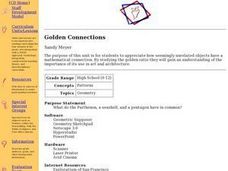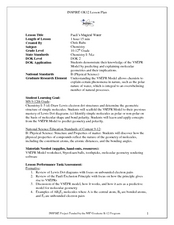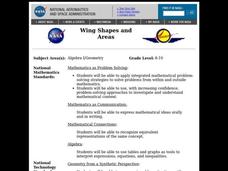Curated OER
Acceptance Through Patchwork
Students are asked to look at differences in people and accept those differences but to examine that people are more alike than different. The lesson has the central focus of investigating diversity.
Curated OER
ART- LANGUAGE OF SYMBOLS
Students discuss how color construct meaning in art. They will demonstrate a technical knowledge and creative use of formal elements and principals of design. Students then discuss the way their selection of color contributed to their work.
Curated OER
The Unknown Secrets of the Rain Forest
Learners explore the rain forest and where they are located. Students examine why the rain forests are important and what is happening to them. They investigate the water cycle and life cycle of a frog. Learners build a rain forest in...
Curated OER
Golden Connections
Students determine the ratio of pairs of consecutive terms in the Fibonacci Sequence. Using four different colors, they create a golden rectangle in either two or three dimensions. They use photographs to create two collages using...
Curated OER
Fractals Forever or Obvious and Hidden Order
High schoolers discuss ways computers use properties of similar figures to generate scale models and create scenes. they describe patterns they have seen on a fern, pineapple, or pinecone. Students research Benoit mandebrot, H. von Koch...
Curated OER
Hurricane Tracking
Students access the Internet to find information on current hurricanes. They get locations, speeds, and air pressures and then plot the location of the hurricane on a hurricane-tracking map. They also access the FEMA website to solve...
Curated OER
Out and About-Creating Design
Students demonstrate the elements of design by creating a digital photography portfolio of photos taken in and arond the scool. The edit photos using Photoshope to emphasize the element of desing in each phot.
Curated OER
Investigating Nets and Polyhedra
Fifth graders create a net for a given polyhedron. They determine the corresponding polyhedron for a given net. Students investigate several polyhedra (cube, tetrahedron, and one of their choosing) and their corresponding nets. They...
Curated OER
It's a 3-D World Out There!
Students construct polygons. They identify attributes of three-dimensional shapes. Students name common three-dimensional shapes. They draw three-dimensional shapes, and sort three-dimensional shapes. Students use K'NEX materials sets to...
Curated OER
Reflections
Fifth graders create a reflection of a poygon using a Mira. They discover that a line connecting a vertiex of a polygon and the corresponding vertex of its reflection is perpendicular to the line of reflection. Students create a glide...
Curated OER
Tiling the Plane
Fifth graders use pattern blocks and triagular grid paper to reivew shape names, be introduced to the concept of a tiling of the plane, and determine which pattern blocks tile the plane. They are asked if they comprehend what a...
Curated OER
The Probability Project
Students work together to complete a project on probability. In groups, they solve probability equations based on the formula and scenerio given to them in a PowerPoint presentation. To end the lesson, they take a quiz on each problem...
Curated OER
Got Complements? with Cabri Jr.
Learners use the axes and measure angle tool to explore and calculate complementary angles with Cabri Jr. They also identify what happens to the calculation as they drag the endpoint into a different quadrant. Finally, they label each...
Curated OER
Graphing and Writing the Rule for Transformations
In this translations worksheet, students graph the given image using the transformations described in six problems and write the rule for the transformation graphed in six more problems.
Curated OER
Reflections
In this math worksheet, high schoolers practice constructing reflections of shapes already present in a grid-based graph. This simple worksheet has 12 problems for the students to solve, and includes an answer sheet.
Curated OER
Tantalizing Tessellations Lesson III: Creating a Slide Translation
Middle schoolers watch and discuss an M. C. Escher video, use what they have learned to explain and apply their knowledge of tessellations in order to create a slide translation, present their findings in a 12" x 18" poster, and explore...
Curated OER
Symmetry In Nature
Students investigate the symmetry that is found in nature. They view shapes and patterns in nature while looking at images. Students look for tessellations while obtaining photographs with a digital camera. The information is used for...
Curated OER
Pauli's Magical Water
Students predict the shape of molecules using VSEPR theory. In this chemistry lesson, students differentiate a polar and nonpolar molecule. They discuss why water's polarity is very important.
Curated OER
Color Me Square
Second graders identify and describe basic geometric solids. Working as a class, 2nd graders describe geometric solids using the proper vocabulary and counting faces, bases, corners, and edges. In pairs, students use a computer drawing...
Curated OER
Exploring Special Segments in Triangles
Students discover that four special segments have a common intersection point. They identify the position of the intersection point in triangles. They produce conjectures about areas of the divided triangles.
Curated OER
Sketchpad
Students investigate the use of Geometer's Sketchpad when studying geometric terms. They use the visualization tools to complete worksheet and design a picture to print and share with the class.
Curated OER
Wing Shapes and Areas
Students, after reading the explanation given below, use FoilSim to determine the weight of the aircraft that can be lifted by a pair of wings of each type. They also design a unique platform of a wing to lift a plane weighing 11500 pounds.
Curated OER
Building Buildings
Students work together with a partnet to design a building. Using materials, they create the inside and outside of the structure along with works of art. They present their creation to the class and receive constructive criticism in return.
Curated OER
Angle Pairs
Students practice identifying right, vertical, and adjacent angles using a Smartboard. They then determine measurements of all of the angles when only one measurement is given.























